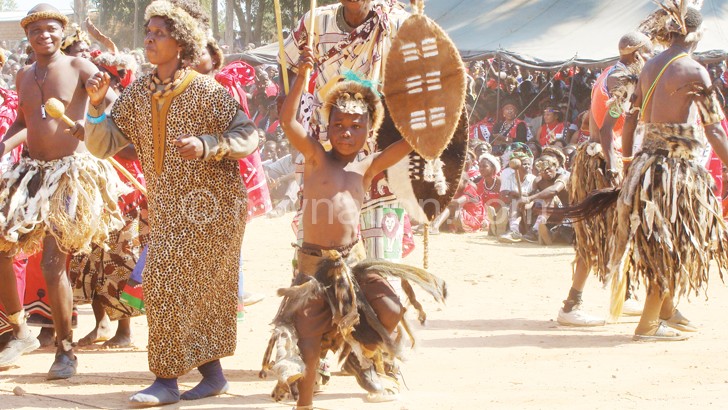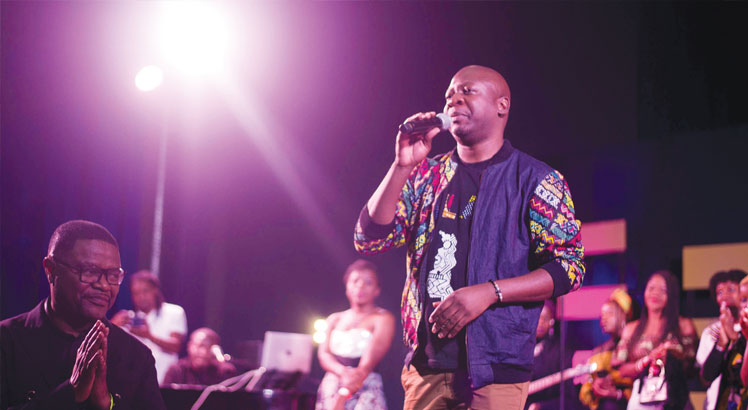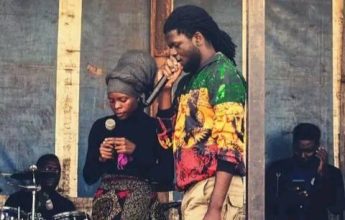Umhlangano: Where Maseko Ngoni reunite
Ngoni women with children strapped on their backs and bundles balanced on their heads. Lanky men armed with bows and arrows as they drive herds of cattle.
These are scanty memories of the warlike tribe fleeing incessant, ruthless wars marshalled by the legendary King Shaka Zulu in South Africa.

The great escape from Zululand, termed Mfecane, forced the Maseko Ngoni to settle in parts of Ntcheu, Mwanza, Balaka and Dedza.
Every year, members of the dispersed tribe come together in Ntcheu to celebrate their heritage, with elders offering the younger generations recollections of the epic journey characterised by relentless raids, assimilation of prisoners of war and intermarriages.
“Ngonis are warriors by nature, but we are also peaceful, says Inkosi ya Makhosi Gomani V.
The youthful king is venerated as ngwenyama (the lion) and gumede (the supreme authority) at his Lizwe la Zulu headquarters where he settled after the triumphant long walks.
The setting, often mispronounced as Lizulu, is the epicentre of Maseko Ngonis based in Mozambique, Tanzania and Malawi who come together to celebrate Umhlangano every year.
Gomani envisions Umhlangano becoming a prime, enriching festival uniting the Ngonis from the three countries to share cultural values, beliefs and memories of their ancestors.
“Umhlangano means coming together, the reunion of people from different directions. Some called it Tsangano, a mispronunciation of this Zulu word. But the event is very important for us,” he said.
The ceremony reportedly seeks to restore the unity, cultural heritage and unique identity of the Ngoni.
The festival is marked by dances, worshipping Inkosi Nkulu Kulu (God) as well as sacrifices to their departed ancestors.
The homage to the dead comprises intercessions for peace and blessings. Standing by ancient tombs, the elders perform mkhwisulo prayers in honour of the spirits.
During the meeting of the living and the dead, they liberate two white doves.
“The doves symbolise peace. We are a peaceful people,” Gomani says.
He urged his subjects to work hard in their crop fields, school, workplaces and various businesses.
The chief warned against laxity, polygamy and drunkenness during early hours.
“Shelve polygamy and womanising to fight against HIV and Aids,” he said.
The youthful king, clad in a leopard skin, occupies the seat of revolutionaries.
His predecessors, including Chikuse, were never shy to confront realities that were militating against the well-being of their people.
Chikuse, who took over in 1870, was martyred for his courageous struggle against colonial repression.
In fact, Umhlangano takes place at Nkolimbo Village where he was gunned down.
“Chikuse was a brave king. He strongly criticised British brutality on Ngonis. He was tied to a tree, gruesomely shot to death in 1891 at Nkolimbo,” says Gomanis impi (soldier) Kandi Padambo.
The historical site is a sacred venue for military dances, including ligubo and ngoma.
The Ngoni elders also slaughter a bull near Chikuse’s monumental tomb to mark the climax of the festival.
“This sacrifice pays respect to Chikuse’s soul. The bull is speared to death by tribal combatants. Just one spear. One hit. No miss,” says Padambo.
The impis have become cultural crusaders.
“Since the institution of Umhlangano, cultural preservation is bearing fruit. Girls are drilled in wuyeni royal dance, while boys learn to fashion their regalia from hides and to dance ngoma,” Padambo explains.
Andrew Kamlopa, who leads a heritage group of Maseko Ngonis living in Lilongwe, speaks highly of Umhlangano.
“With the festival, we are able to practise what our culture demands while miles away from home. Youngsters know traditional etiquette like squatting and kneeling before elders as well as how to dance and knit,” says Kamlopa.
The city dwellers have introduced Isizulu to restore the original Ngoni language which has been eroded by migration and intermarriages.
The language classes are gaining popularity as many realise the importance of mother tongues.
Gomani V, who was crowed on August 5 2012, is happy with the reconstruction of Ngoni culture.
To him, Umhlangano has three cornerstones—unity, love and godliness—which are vital for cultural and national integrity.
He wants Nkolimbo to be a fully equipped heritage centre where Malawians can meet, mingle, learn cultural values and appreciate history. n





